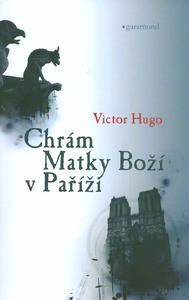Take a photo of a barcode or cover
This book tells the story of Quasimodo, the hunchbacked bell-ringer of the Notre Dame, his love for Esmeralda the gypsy, and their relation with Claude Frollo and Phoebus.
Let me get a few things straight:
1. The Disney film based on this book is my favourite Disney film. Ever.
2. I have read Les Misérables by Victor Hugo, too, and can now conclude that I love the stories that Victor Hugo writes, but not his books.
Now, about the first point: I understood when going into this book that they would be different. After all, the Disney film is pretty much a romance: good (Quasimodo) triumphs evil (horny Frollo). The book is a lot more of a tragedy in which good people get ruined by forces outside of themselves (I’m pretty sure you can make an argument for both Frollo and Esmeralda being the good people ruined, and probably for Quasimodo, too). However, I have issues with this book, and I’m going to list those:
- Victor Hugo is clearly getting paid by the word. He talks and talks and talks about so much. He gives the backstory of people, buildings, objects, quarters and probably more, some of them only remotely connected to the story. Not all of those are bad, of course (the backstory of Quasimodo and Frollo and Esmeralda were all highly interesting and highly relevant), but I could not help but feel annoyed when I had to slosh yet another chapter relating the history of a building that we never saw in the story again. It sucked every bit of suspension out of the story. Les Misérables suffered from this problem at times, too, but I didn’t find it as annoying there.
- Esmeralda is so freaking dumb. I don’t blame her for Frollo chasing after her (of course not), but I do feel that she is so incredibly naïve. This is a girl who grew up on the streets, for crying out loud, but she totally falls head over heels for Phoebus, the handsome captain of the guard, despite it being so clear that he is a huge dick who is only interested in sex. Then there was that ending, in which she ruins it for herself and her mother, and I was ready to throw this book against the wall. Again, let me state that Esmeralda grew up on the freaking street, living with gypsies who dabbled in criminal activities. How can she be so stupid?
I was pleasantly surprised that the authorial voice did not belittle Quasimodo for being handicapped. I feared the worst, but the authorial voice was actually very friendly when describing Quasimodo, explaining that he wasn’t the greatest guy to be around, but that that had logical explanations.
Though this book wasn’t the worst, I certainly didn’t enjoy it as much as I had hoped to.
Let me get a few things straight:
1. The Disney film based on this book is my favourite Disney film. Ever.
2. I have read Les Misérables by Victor Hugo, too, and can now conclude that I love the stories that Victor Hugo writes, but not his books.
Now, about the first point: I understood when going into this book that they would be different. After all, the Disney film is pretty much a romance: good (Quasimodo) triumphs evil (horny Frollo). The book is a lot more of a tragedy in which good people get ruined by forces outside of themselves (I’m pretty sure you can make an argument for both Frollo and Esmeralda being the good people ruined, and probably for Quasimodo, too). However, I have issues with this book, and I’m going to list those:
- Victor Hugo is clearly getting paid by the word. He talks and talks and talks about so much. He gives the backstory of people, buildings, objects, quarters and probably more, some of them only remotely connected to the story. Not all of those are bad, of course (the backstory of Quasimodo and Frollo and Esmeralda were all highly interesting and highly relevant), but I could not help but feel annoyed when I had to slosh yet another chapter relating the history of a building that we never saw in the story again. It sucked every bit of suspension out of the story. Les Misérables suffered from this problem at times, too, but I didn’t find it as annoying there.
- Esmeralda is so freaking dumb. I don’t blame her for Frollo chasing after her (of course not), but I do feel that she is so incredibly naïve. This is a girl who grew up on the streets, for crying out loud, but she totally falls head over heels for Phoebus, the handsome captain of the guard, despite it being so clear that he is a huge dick who is only interested in sex. Then there was that ending, in which she ruins it for herself and her mother, and I was ready to throw this book against the wall. Again, let me state that Esmeralda grew up on the freaking street, living with gypsies who dabbled in criminal activities. How can she be so stupid?
I was pleasantly surprised that the authorial voice did not belittle Quasimodo for being handicapped. I feared the worst, but the authorial voice was actually very friendly when describing Quasimodo, explaining that he wasn’t the greatest guy to be around, but that that had logical explanations.
Though this book wasn’t the worst, I certainly didn’t enjoy it as much as I had hoped to.
favourite book of all time & basically ur faves would never
(ノ◕ヮ◕)ノ*:・゚✧
(ノ◕ヮ◕)ノ*:・゚✧
dark
emotional
sad
slow-paced
Strong character development:
Yes
Loveable characters:
Yes
Diverse cast of characters:
Yes
Flaws of characters a main focus:
Yes
dark
emotional
reflective
tense
slow-paced
Strong character development:
No
Loveable characters:
Yes
Diverse cast of characters:
No
Flaws of characters a main focus:
Yes
slow-paced



